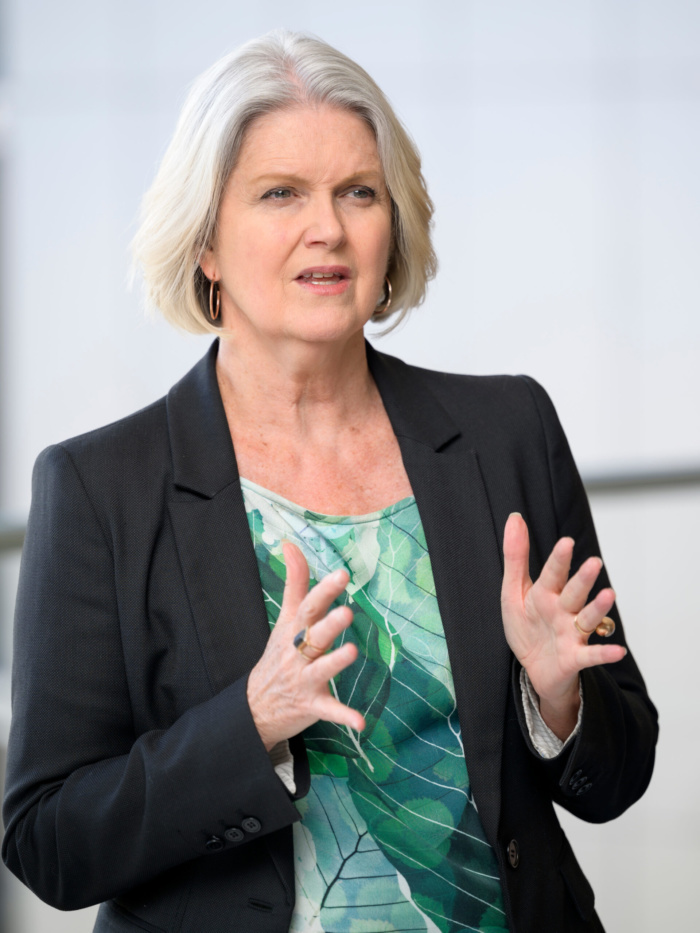
What not-for-profit leaders need to know in 2026
Posted on 12 Feb 2026
Our special NFP trends report distils the views of more than two dozen experts.
Posted on 12 Aug 2025
By Nick Place, journalist, Institute of Community Directors Australia

Australian Council of Social Services leader Dr Cassandra Goldie has named First Nations justice as her organisation’s top priority for the second term of the Albanese government.
Speaking to the Institute of Community Directors Australia’s Matthew Schulz on the Not-for profit Agenda webinar last Thursday, Goldie said she had already raised the issue in her first meeting with Social Services Minister Tanya Plibersek, as the government’s second term gets underway.
“ACOSS has a First Nations pledge which has set out how we want to back in and support the advocacy and priorities for First Nations colleagues,” she said, “and we’re looking forward very much to the roundtable we’ll be having with our First Nations members in a few weeks’ time. It’s very important that we continue to elevate those issues. The Close the Gap agenda has a lot of concerning information in it, and we were really struck by how significant the First Nations voices are at this time, and I know the prime minister's just come back from [the] Garma [festival]. I’m very happy to talk in further detail about what we’re seeing there.”
An independent review of the national Closing the Gap strategy by the Jumbunna Institute for Indigenous Education and Research, at Sydney’s University of Technology – the first independent assessment of the strategy since it was established in 2008 – found that there were serious shortcomings in the strategy’s ambitions and reality.

The Jumbunna Institute found that Aboriginal and Torres Strait Islander communities and organisations were doing “the heavy lifting”, compared to all layers of government, while being under-resourced.
Systematic failures due to government inaction and structural racism were holding back Indigenous advancement, it found.
“Despite the National Agreement commitment to identifying and eliminating racism, no systemic steps have been taken despite, or perhaps because, racism is a deeply rooted problem that was baked into government institutions from their very inception of this country,” it said.
As chief executive officer of ACOSS, Goldie intends to strongly push this agenda with government, while also pushing for tax reform, in her role as the charity and NFP sector’s voice at the federal government’s forthcoming economic roundtable.
“We’ve identified what government needs to do, how we want to change things so that we are as productive, as effective, as we possibly can be. You know the care sector is growing as it needs to, and for us, productivity is about quality and great outcomes for people and communities. All of that is tax reform.
“I love talking about tax, because it’s so important. It’s our greatest act of love to each other that we pay our fair share, and we don’t think the tax system is designed at the moment in a way that is adequate for the revenue that we need, for the essential services, for investment in big things like the energy transition, and also the tax rules are encouraging behaviours for investors that are not helpful – for example, driving up housing prices. We’d rather see that investment going into innovation and areas where we’re going to grow the great jobs now and into the future.
“I love talking about tax, because it’s so important. It’s our greatest act of love to each other that we pay our fair share, and we don’t think the tax system is designed at the moment in a way that is adequate for the revenue that we need.”
“There’s no question overall that the country needs to raise more revenue. We’re the ninth lowest when it comes to the tax base that we raise as a country amongst all the OECD countries. So that’s why, when people say, why can’t I get my kids into childcare, why am I continuing to struggle with aged care, and why do we still have one in eight people, including one in six children, living in poverty? Part of that is about the revenue base that we have available. Yes, we need to spend the money we collect already better, and we’re up for that discussion, in going into this roundtable, but we certainly need to raise more revenue into the future.
“In the end it goes to the basics, doesn’t it? It’s about: do I have enough income to look after myself and my family? Do I have a safe place to call home? Can I keep the lights on and pay my energy bill? And when I need help, do I have the support services available for me and for my kids to be in childcare and my parents to be in aged care? It is kind of simple in that way, and so I would like to bring it back to those basics to explain that in the end we know when we’re going in the right direction, and we know when we’re going in the wrong direction. In far too many of those basic areas of human need and human rights, we’re not where we would want to be. It’s a very wealthy country … and the adequacy and the effectiveness of social security is so important it should be a safety net.”
ACOSS has already released its submission to the reform roundtable, urging government to address rising economic inequality, both as a drag on productivity, and as a moral need.
Speaking on the NFP Agenda webinar, Goldie said a priority at the roundtable would be “fixing the adequacy and effectiveness of the social security system, raising the rate to make sure that people are able to feed themselves and keep a roof over their head and moving to more simplification of the system, so that it does not act as a barrier for people who are moving in and out of paid work, for example, elevating and fixing employment services. For too long, we’ve had employment services that are so damaging for people,” she said.
ACOSS will also enter the roundtable looking to speed the clean energy transition, strengthen resilience to climate change, and drive the supply of more social housing.
“An ACOSS priority is housing affordability,” she said. “Of course we have elevated that. We think part of that is to fix housing taxes to make sure that we’ve got a better supply of long-term housing. Then we’re not damaging, lifting up the cost of housing and growing economic inequality. So we'd call back the capital gains discount there. That would be our top priority at the moment to reduce that by half, and we’d use those precious dollars to go straight into social housing every single day. We want to see more social housing built to get us to at least one in 10 of housing stock.”
In its submission, ACOSS has said “the roundtable should give priority to far-reaching structural reform” and called for reform to the tax system in four specific ways. To raise revenue, reduce inequality and drive action to address climate change, ACOSS argues the following need to happen:
To read the ACOSS submission in full, click here.
To review what Goldie and other sector leaders had to say on ICDA’s Not-for-profit Agenda news webinar, click here.

Posted on 12 Feb 2026
Our special NFP trends report distils the views of more than two dozen experts.

Posted on 27 Jan 2026
With a laser focus and the right tools, this volunteer-led NFP is unlocking life-changing…

Posted on 14 Jan 2026
As the holiday chatter fades and the new year begins, it’s the ideal time for organisations to plan…

Posted on 13 Jan 2026
This page provides information about financial assistance available to not-for-profit organisations…

Posted on 10 Dec 2025
The Australia Institute has called on the federal government to force Australian businesses to be…

Posted on 11 Nov 2025
Australian charities are curious about how to use artificial intelligence and are increasingly…

Posted on 11 Nov 2025
Thousands of not-for-profit organisations are being held back by an outdated, rigid and complicated…

Posted on 11 Nov 2025
New grants worth $36 million aim to help farmers and farming communities prepare for drought by…

Posted on 05 Nov 2025
The number of registered charities in Australia ballooned in the last financial year by 4621 new…

Posted on 01 Oct 2025
Persistence, planning and strategic focus continue to be the keys to grant success, according to…

Posted on 30 Sep 2025
I am proud of what Our Community, and its exceptional team, have achieved in the past 25 years. As…

Posted on 30 Sep 2025
Globally, collective giving is increasing in popularity as a fundraising method. Now, Philanthropy…